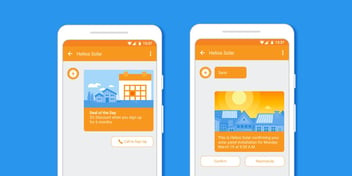
From SMS to Messaging Apps & Now... RCS
RCS isn’t just an SMS replacement, it’s also aiming to disrupt the entire mobile messaging market.
In 2018, an estimated 75% of all mobile messaging traffic will be sent through messaging apps like WhatsApp, WeChat, or Facebook Messenger. That’s including SMS, existing RCS, social media messaging, and mobile email among the total volume.
Yet messaging apps only account for a mere 2% of the revenue that mobile operators can generate off mobile messaging. Cue the music for the arrival and expansion of RCS.
But first, let’s explore how we got here.
SMS, OUR OLD FRIEND
SMS is the universal protocol for sending text messages on mobile devices. Most mobile devices are SMS-enabled without the need to download additional apps.
But SMS is long in the tooth and hasn’t changed much since implementation. It still has a 160-character limit, even fewer if special characters are used, and is a text-only medium.
While SMS has remained a relevant communications channel, mobile device technology has been advancing rapidly. Online-enabled smartphones have become the most common mobile device and have introduced mobile apps to the market.
In an age of mandatory data plans for smartphones, SMS messaging isn’t free.
THE INTRODUCTION OF MESSAGING APPS
There’s a reason younger generations have embraced messaging apps over standard text messaging; you can send and receive messages for free, in most cases.
That, coupled with richer features, have made messaging apps like WhatsApp the preferred mobile messaging solution.
Messaging app features have surpassed SMS capabilities in many ways:
- Larger message capacity
- Text and message formatting like effects or wallpapers
- In-message pictures, video, gifs, and animations
- Send and receive messages over data rather than carrier signal
- Message delivery tracking (read receipts)
- Document/file sharing
- Calendar integration
- Send messages on PC
- Make voice calls
- Map location sharing/invitations
- Money transactions
SMS can’t hold a candle to these types of features, which users have come to expect from their messaging platforms.
In 2012, Apple released a messaging app upgrade of its own called iMessage. This gave Apple users the ability to send SMS or rich messaging from the same preinstalled “messages” inbox to other users within the Apple ecosystem.
Like messaging app communications, iMessage sends and receives over data only. It’s more feature rich than SMS, although not as robust as some messaging apps. iMessage’s similarity to messaging apps and universal capabilities on all Apple devices has made it a popular messaging platform because of convenience, speed, and usability.
By 2016, the number of iMessages sent per second was 200,000. Device owners have never been clearer:
82% of people prefer RCS capabilities over SMS
AND THEN THERE WAS RCS
RCS isn’t just an SMS replacement. It aims to eliminate the demand for iMessage and messaging apps globally by bringing messaging back to the mobile channels.
Like SMS capability and Apple’s iMessage, RCS will be available in the preinstalled “messages” inbox on all eligible devices. It will send messages over data or WiFi, not via carrier signal. And it offers all the features listed above and then some:
- Rich card carousels
- Quick reply buttons
- Suggested action buttons
- Interactive web snippets
Interested businesses are able to join Google’s RCS Business Messaging program to discover how RCS can amplify their current SMS campaigns to create better marketing, customer service, and improve the experience for their customers.
The future of mobile messaging
- 49% of consumers prefer messaging with businesses over phone calls
- 69% of Gen Y prefers messaging for business communications over other mediums like mobile apps
RCS makes the future of universal mobile messaging that much closer to reality.
Curious what else RCS can offer your business? Download the free eBook to find out! 



